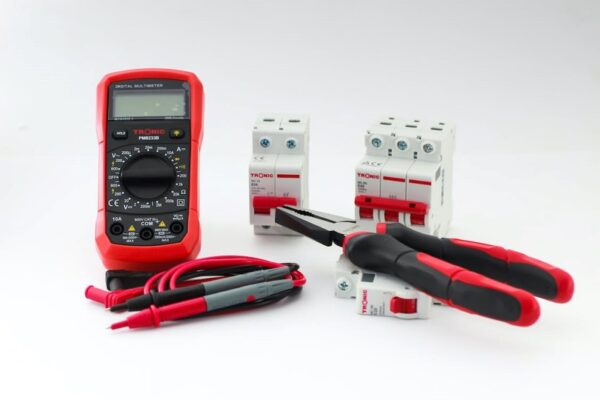What Is a Multimeter?
A multimeter is an electronic device that is used to measure voltage, current, and resistance in electrical circuits. It is a versatile tool that is commonly used by electricians, technicians, and DIY enthusiasts for a wide range of applications.
Key Types of Multimeters
Analog Multimeter
An analog multimeter is an older technology that uses a needle to indicate the measurement of voltage, current, or resistance. It is less precise than a digital multimeter but is often preferred by professionals for certain applications.
Digital
A digital multimeter is a modern technology that displays measurements on an LCD screen. It provides more accurate readings than an analog multimeter and is easier to use.
Clamp Meter
A clamp meter is a specialized type of multimeter that can measure current without requiring the user to break the circuit. It is particularly useful for measuring current in high-voltage applications.
Automotive Multimeter
An automotive version is designed specifically for use in automobiles. It can measure voltage, current, and resistance, as well as other parameters specific to automotive applications.
HVAC Multimeter
An HVAC version is designed specifically for use in heating, ventilation, and air conditioning systems. It can measure temperature, humidity, and other parameters specific to HVAC applications.
Points to Consider When Buying
Accuracy
The accuracy of a multimeter is an important consideration. Look for a multimeter with a high degree of accuracy, particularly if you will be using it for precise measurements.
Resolution
The resolution of a multimeter refers to the smallest increment that it can measure. Look for a multimeter with a high resolution if you need to measure very small changes in voltage or current.
Safety
They can be dangerous if not used properly. Look for a multimeter that meets safety standards and includes features such as overload protection and automatic shut-off.
Range
The range refers to the highest and lowest values that it can measure. Look for a multimeter with a range that is appropriate for the types of measurements you will be making.
Display
The display should be easy to read and provide clear, accurate measurements. Look for a device with a backlit display if you will be working in low-light conditions.
Durability
It is a tool that is likely to be used frequently, so it is important to choose one that is durable and built to last. Look for a multimeter that is made of high-quality materials and is designed to withstand wear and tear.
Price
Multimeters are available at a wide range of price points. Look for a multimeter that fits your budget while still meeting your needs in terms of accuracy, resolution, and features.
In summary, a multimeter is a versatile tool that is essential for anyone working with electrical circuits. When choosing a multimeter, consider the type of measurements you will be making, the accuracy and resolution you need, and the safety features and durability of the device. By selecting the right multimeter for your needs, you can ensure accurate measurements and safe operation.
Comparison of Key Types of Multimeters
| Criteria | Analog | Digital | Clamp | Automotive | HVAC |
|---|---|---|---|---|---|
| Display | Analog scale | Digital display | Digital display | Digital display | Digital display |
| Accuracy | Less accurate | Highly accurate | Highly accurate | Highly accurate | Highly accurate |
| Measurement functions | Basic functions (voltage, current, resistance) | Advanced functions (capacitance, frequency, temperature) | Basic functions (voltage, current, resistance) with AC/DC current measurement capability | Additional automotive specific functions (duty cycle, RPM) | Additional HVAC specific functions (temperature, humidity) |
| Price range | Inexpensive | Moderate | Moderate | Moderate to high | Moderate to high |
| Ease of use | Requires interpretation of analog scale | Easy to read digital display | Easy to read digital display | Easy to read digital display with specific automotive functions | Easy to read digital display with specific HVAC functions |
| Power source | No battery required | Battery required | Battery required | Battery required | Battery required |
| Size | Large and bulky | Compact and portable | Compact and portable | Compact and portable | Compact and portable |
| Durability | Sensitive to impact and environmental factors | More durable than analog | More durable than analog | Designed for automotive use, durable | Designed for HVAC use, durable |
| Safety | Lower safety features | High safety features, includes overload protection | High safety features, includes overload protection | High safety features, includes overload protection | High safety features, includes overload protection |
| Applications | Basic electrical testing, ideal for hobbyists | Advanced electrical testing, ideal for professionals | Electrical testing with AC/DC current measurement capability | Specific automotive electrical testing, ideal for mechanics | Specific HVAC electrical testing, ideal for technicians |
| Brand examples | Simpson, Fluke | Fluke, Klein Tools | Fluke, Amprobe | Innova, Actron | Fieldpiece, UEi |
Note: Criteria may vary depending on the specific model and brand of the multimeter.
FAQs
What is a multimeter, and why is it important to have one?
A multimeter is a versatile tool that measures voltage, current, and resistance. It’s essential to have one if you’re working with electronics, as it helps you troubleshoot issues and determine whether your circuits are functioning correctly.
What are the different types of multimeters, and how do they differ from each other?
The three main types are analog, digital, and clamp. Analog multimeters use a needle to indicate readings, while digital multimeters display them on a screen. Clamp multimeters measure current by clamping around a wire. Each type has its own benefits and drawbacks.
How do I choose the right multimeter for my needs?
Consider what type of measurements you’ll need to take, as well as the accuracy and range of the multimeter. Look for additional features like auto-ranging and data logging if you need them. It’s also important to consider the brand and quality of the multimeter.
Can I use a multimeter for other purposes besides electronics?
Yes, multimeters can be useful for a variety of tasks, such as checking battery voltage, testing household outlets, and measuring the continuity of wires.
Do I need to calibrate my multimeter, and how often should I do it?
Calibration ensures that your multimeter is providing accurate readings. It’s a good idea to calibrate it annually or whenever you notice that it’s giving incorrect readings.
How do I use a multimeter safely?
Make sure to read the manual and follow safety precautions when using a multimeter. Avoid touching the metal parts of the probes when they’re in use, and never use a multimeter on a circuit that’s still live.
Can I use a multimeter if I have no prior experience with electronics?
Yes, but it’s important to educate yourself on basic electronic principles and safety precautions before using a multimeter. There are plenty of resources available online or at your local library to help you get started.
How much does a multimeter cost, and where can I buy one? Multimeters can range from around $10 to over $200, depending on the features and quality. You can purchase them at hardware stores, electronics retailers, or online. It’s important to choose a reputable brand and quality multimeter that fits your needs and budget.
Thank you for reading. I hope you enjoyed the article. Please share it with your friends and family. If you have any comments or suggestions, please comment below. You can also follow us on Facebook, Instagram, and Twitter. Do not forget to give us a LIKE or SUBSCRIBE.
You might also be interested in:
Types of Nails & how to choose
Types of Sealants for DIY Projects
——————————————————————————————————————————————
Homecazt is a home & garden Magazine. We provide practical tips, ideas and inspirations. Our comprehensive collection of articles, tips, and ideas can help you transform every room in your home, and create a beautiful, functional, and stylish space. The articles published in our magazine are intended to provide general information and ideas related to home decor, home improvement, gardening, and related topics. We strive to provide accurate and up-to-date information, but readers should always conduct their own research and consult with professionals before undertaking any home decor, home improvement or gardening projects. Our magazine accepts no liability for any damages or losses that may result from the use of information presented in our articles.




